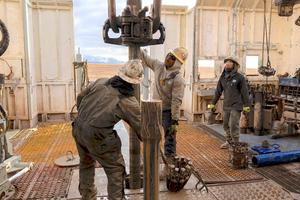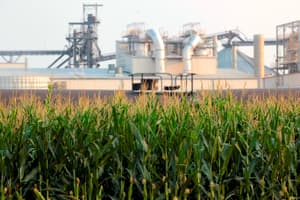A tanker ship designed specifically to transport liquefied natural gas. JoachimKohlerBremen/Wikimedia Commons
A plan to build a major liquefied natural gas export facility in southern New Jersey, across the Delaware River from Philadelphia, is being met with increasing scrutiny and opposition from environmentalists and nearby communities. The $450 million project would send liquified natural gas from Pennsylvania’s Marcellus Shale region to ports in Puerto Rico, Mexico, and Europe.
The Delaware River Basin Commission (DRBC), an interstate agency that regulates river development, originally approved the project — an expansion of the Gibbstown Logistics Center — in June 2019, but the decision was appealed by the Delaware Riverkeeper Network, delaying the project. In September, the DRBC voted to delay the final permitting. A final decision on the facility, which has also received permits from the New Jersey Department of Environmental Protection and the U.S. Army Corps of Engineers, is expected by year’s end.
According to The Philadelphia Inquirer, the project’s supply chain and location are unusual. Most export facilities are located near deepwater ports, and fuel is loaded directly from an LNG plant onto vessels. But the proposed Gibbstown expansion requires dredging the Delaware River to make it deeper and building a second dock. The natural gas will also be transported hundreds of miles on trains and trucks to the facility from the Marcellus Shale region. According to a permit application, New Fortress Energy, one of the developers of the project, said it expects the facility will receive natural gas from several 100-car trains or up to 700 tractor trailers every day.
“We look at every part of the supply chain that this project entails, and we consider every single step of it to be dangerous and untested,” Delaware Riverkeeper Network Deputy Director Tracy Carluccio told FreightWaves, an industry news site.
More than a dozen environmental groups have joined the Delaware Riverkeeper Network and the New Jersey chapter of the Sierra Club in opposing the Gibbstown export facility. In September, these groups handed Commission members petitions with more than 50,000 signatures, The Inquirer reported. Several local governments — including Lehigh County, Kutztown Borough, and Clarks Summit in Pennsylvania, as well as Runnemede Borough in New Jersey — have passed legislation opposing the transport of LNG within their borders, according to WHYY. Several Philadelphia City Council members have also expressed concern about the project.
In addition to fighting the approval of the Gibbstown export facility, environmental groups have also filed a lawsuit against a new rule approved by the U.S. Pipeline and Hazardous Materials Safety Administration allowing for the transit of liquefied natural gas by rail. The Gibbstown project received the country’s first permit approval for the transport of LNG by specialized railcars back in December 2019. And in June, the administration, an arm of the Department of Transportation, expanded that decision, publishing a rule allowing for nationwide rail shipments of natural gas in doubled-lined tank cars, known as DOT-113s.



